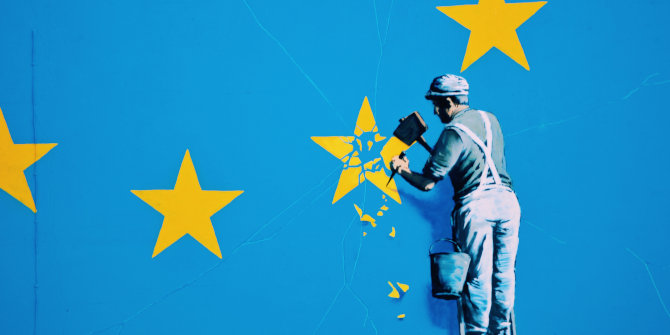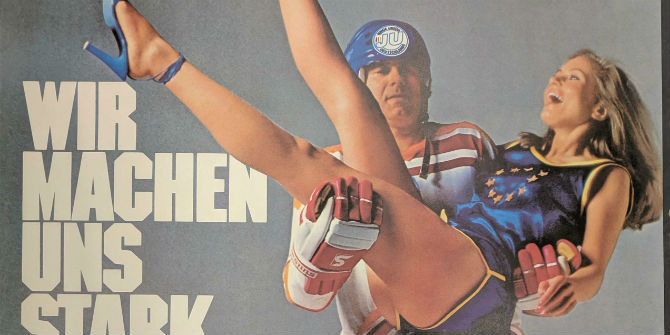 Brexit may have been driven by those ‘left behind’ by globalisation, automation, the evolution of manufacturing, and the increased inequality of both income and wealth. Some have suggested that this feeling of being ‘left behind’ is exacerbated for working-class white men, in declining industrial and disadvantaged areas in particular. Julie MacLeavy (University of Bristol) draws on research with Leave voters in Sunderland to argue that in this constituency many men do see their opportunities for economic advancement and achievement fading away, and identified that as a key motivation for voting Leave. But rather than constituting a self-evident ‘crisis of masculinity’, the roles played by gender conceptions in the Brexit vote point to a much broader and more complex series of questions.
Brexit may have been driven by those ‘left behind’ by globalisation, automation, the evolution of manufacturing, and the increased inequality of both income and wealth. Some have suggested that this feeling of being ‘left behind’ is exacerbated for working-class white men, in declining industrial and disadvantaged areas in particular. Julie MacLeavy (University of Bristol) draws on research with Leave voters in Sunderland to argue that in this constituency many men do see their opportunities for economic advancement and achievement fading away, and identified that as a key motivation for voting Leave. But rather than constituting a self-evident ‘crisis of masculinity’, the roles played by gender conceptions in the Brexit vote point to a much broader and more complex series of questions.
Economic stagnation and the experience of different forms of marginality are widely claimed to underpin the 2016 vote in favour of Britain leaving the EU. The Vote Leave campaign’s vow to ‘take back control’ seemed to resonate with those feeling adrift and ‘left out’ of a changing economic and social environment. In particular, the process of deindustrialisation, the increasing dominance of feminised service-sector employment in which masculinity is often seen as a labour market disadvantage, and an ongoing lack of meaningful alternatives to paid work as a basis for male identity have been linked to a ‘crisis of masculinity’. Iain Duncan Smith is amongst those expressing concern about the difficulties some men face in adapting to the gender order emergent from economic restructuring and the slow dismantling of patriarchal structures that has occurred alongside.

Such broad characterisations need to be treated cautiously and interrogated further, of course. Recent work by economic geographers on UK regional differences in recessionary cuts, crisis and recovery, as well as earlier research on local cultures of working class masculinity in deindustrialised Northern regions of the UK compared with an affluent service-dominated southern region, point towards the diversity of male experience. Whilst some men have been able to adjust and harness new labour market opportunities, it does appear that there are others for whom the spatially uneven effects of economic restructuring have served to fuel personal and political anxieties. Analysis of the British Election Study shows a gender gap among voters, with older males with few educational qualifications most likely to vote leave, economically independent women more likely to vote remain and women dependent on a male partner tending to vote in line with his political preferences. Our own case study research further reveals that voters in Sunderland, as a deindustrialised city in the North East of England, voted to leave the EU in opposition to a system that they perceived had quashed their labour market capabilities through the reconfiguration of the gender and race ‘order’. For older male voters in particular in that case, the deterioration in what had been the normative or standard employment relationship for white working-class men was consistently found to be associated in their view with EU policy supporting growing diversity of the labour market.
Such research indicates that in order to address the frustrations with the lived experience of economic and social transformation, channelled through the Brexit vote by UKIP and the wider Leave movement, we need to pay greater attention to complexities of contemporary gender relations. The extent to which social constructions of ‘acceptable’ masculinity have shifted in response to improved labour market equality for women, as well as the negative personal (and sometimes political) effects of the dismantling of status hierarchies based on gender difference that have been hard won by feminist campaigns, need to be critically evaluated and addressed.
More specifically there is a pressing need to understand the reasons why only some men recognise the benefits of women’s recent gains. What reasons may exist to fear the EU’s ‘gender machinery’? We know that European efforts to secure equal rights have benefited gay, bisexual and transgender men who are afforded protections against historical oppressions and former limits on non-traditional gender and sexual behaviour, but ever-growing numbers of straight men are also now ‘going against the grain’ of previously dominant conceptions and expectations of masculinity. This includes men employed in what was once considered ‘women’s work’ such as nursing or caring roles, as well as those in all sectors forging non-traditional employment and familial arrangements. Recent decades have, for instance, seen men harnessing the new opportunities available – in part a result of the EU’s influence on UK paternity rights – for adding nurturing and caregiving to fathers’ traditional roles of providing income. Why, then, the pockets of opposition to this?
Given what’s at stake for equality and diversity we ought to broaden the Brexit conversation to ensure that ‘gender’ is not just equated with ‘women’ or how women voted. Gender qua women limits our understanding of the impact of recent economic and social developments. All too often the conditions that are leading to anxieties about manhood are glossed over, or used to infer a link between men’s struggles and the opening up of jobs for women in a manner that bypasses the institutionalised injustices and gender inequalities that have long betrayed democratic ideals. By foregrounding gender and its intersectional articulations – with, for example, conceptions of ‘valued’ forms of work – we can better unpack the emotions that the Brexit vote has galvanised and address the array of problems from which they emerge, rather than treating connections to a ‘crisis of masculinity’ as self-evident or straightforward.
The above draws on the author’s co-authored work in the journal Environment and Planning C: Politics and Space. This article gives the views of the author, not the position of LSE Brexit or the London School of Economics.
Julie MacLeavy is a Reader in the School of Geographical Sciences, University of Bristol.







The possible reasons why some people voted Leave or Remain are many and varied but it is stretching things a bit to far to try and include a “crisis of masculinity” amongst them.
As for the EU being behind the gains this country has made in “across the board equalities”, this is stretching credulity to far.
I agree.with Kar. I just do not think people like Julie MacLeavyunderstand how badlysome people feel about the way their communities have been treated.by our Governments and the EU. To allow the whole fishing industry to be destroyed because of EU policy is something which has upset a lot of fishermen who are on the whole men.It has upset their wives, and destroyed their towns. Our governments both Left and Right are to blame for only looking at London. To cap it all London. is constantly finding ways to rid itself of people it does not want to places like the Northern seaside towns.There they are housed in grotty run down housing often owned by a London lanlord on the make from yet another mistake which is the Buy to Let business. It would be saying something if Julie Macleavy was able to explain better why 64%of people voted to leave. What she seems to be saying that the leave vate was caused because of badly educated white men with a grudge.I think she should get out more. Buy the way, a lot of people will not admit they voted Leave because of the Flack they get. The usual comments are , white old, ill educated ,stupid, racist and bigoted..
Margaret: “To allow the whole fishing industry to be destroyed […]”
“UK vessels landed 724 thousand tonnes of sea fish […] UK fishing fleet remained seventh largest in the EU […] 11,700 fishermen were active in the UK […]”
https://www.gov.uk/government/news/fishing-industry-in-2017-statistics-published
“Our own case study research further reveals that voters in Sunderland, as a deindustrialised city in the North East of England, voted to leave the EU in opposition to a system that they perceived had quashed their labour market capabilities through the reconfiguration of the gender and race ‘order’.”
The case research linked to is here http://journals.sagepub.com/doi/10.1177/0263774X18804225 .
To save people the trouble of reading the article, I append the quotations it cites from the interviewees. These happen to be all male perspectives, unsurprsingly, because the study authors chose to interview only men, for reasons which are not very clear to me. Can someone explain to me where the opposition to the gender politics of the EU is here? I can’t find it.
“What closed Sunderland down was the European Common Market…with the Common Market every country is given a job to do and it was Nissan in Sunderland.”
“You could walk job to job, trade to trade, company to company, you could get a job off anybody. You’d never be out of work until Thatcher took over.”
“Up here, you are who you are. We ain’t racist…as long as they’re coming in and putting something into the country that’s ok.”
“The cost of my wine’s gonna go up. So what? It’s gonna make the English economy more viable, more domestic.”
“They’re now building a bridge for our river. It’s being built in Belgium!! It could have been built here rather than dragged across the whole North Sea!”
“The EU…the only people they’re benefiting are those people [EU staff] sat in those offices”
“No one knows where the money has been going all these years…I suspect some of the directors should be in jail!”
“We’ve seen nice new hospitals, for example, the RVI in Newcastle – that’s EU funded – but we haven’t felt it in our pockets or changes in our standard of living.”
Certainly the article is not specifically focused on gender politics, but there are other quotes in the article that provide support for claim that voters feel the EU has focused on equality and women’s rights at the expense of the negative effects of economic restructuring. e.g. EU is “all do-gooders [and] human rights”.
I read the blog as wanting to open up a conversation about gender that goes beyond the popular framing of male voters (‘badly educated white men with a grudge’) that Margaret takes issue with.
@Ann, I think you are reading and the article author are reading a lot into the short phrase “all do-gooders [and] human rights”. Of course “women’s rights” are part of human rights, but so are many other things. The original speaker could just as well have been talking about the right of people with children in other EU countries to child benefits, or about a hundred other rights which the EU enforces.
The game is rather given away in the same paragraph you quote “Implicit in this discussion was a sense that the negative effects of economic restructuring had been compounded by EU efforts around equality and women’s rights”. Implicit means not explicit. So the interviewees were not explicitly addressing gender issues at all, that is an inference by the article’s authors. And this is where I lose patience. It is a very good idea to go and interview people about why they voted the way they did in the EU referendum, but then your first job is to report what the people are saying, not your own spin on why they are saying it.
I would contrast this article with the post to this blog by Lisa McKenzie. https://blogs.lse.ac.uk/brexit/2018/01/15/we-dont-exist-to-them-do-we-why-working-class-people-voted-for-brexit/ . Taken with the quotes I lifted above from the article Julie MacLeavy cited, I feel I get a fairly good idea why many people voted for Brexit. But gender has little to do with it.
“Some have suggested that this feeling of being ‘left behind’ is exacerbated for working-class white men, in declining industrial and disadvantaged areas in particular.”
Why be racist by introducing skin colour? In Sunderland, 93% of workers are white according to Wiki. So The views of working men in Sunderland are necessarily those of white people by and large, but that isn’t relevant.
” older males with few educational qualifications”
Older males and females necessarily have few qualifications because they had less educational opportunities. They are older, the fact they have fewer qualifications is not directly relevant. The two factors are confounded, it is age that is the primary characteristic. You are being ageist and unnecessarily derogatory by mentioning their qualifications.
“What reasons may exist to fear the EU’s ‘gender machinery’?”
Yeh right! I have seen the EU policy in action and I quote from a Eurocontrol meeting at which I was a participant.
“Gentlemen!, by the next meeting I need your organisation’s statements on gender equality!